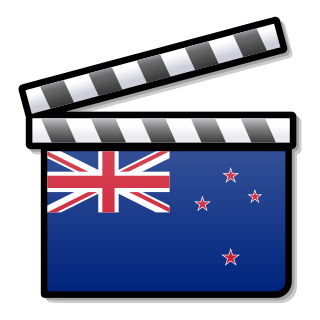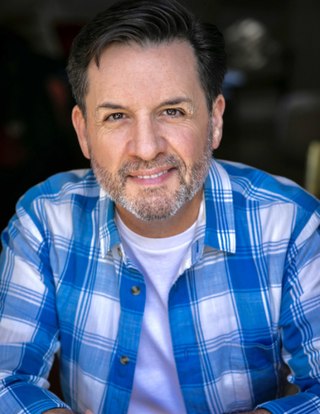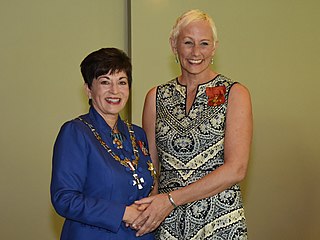
New Zealand cinema can refer to films made by New Zealand-based production companies in New Zealand. However, it may also refer to films made about New Zealand by filmmakers from other countries. Due to the comparatively small size of its film industry, New Zealand produces many films that are co-financed by overseas companies.

Television New Zealand, more commonly referred to as TVNZ, is a television network that is broadcast throughout New Zealand and parts of the Pacific region. All of its currently-operating channels are free-to-air and commercially funded.
Shortland Street is a New Zealand prime-time soap opera centring on the fictitious Shortland Street Hospital, first broadcast on TVNZ 2 on 25 May 1992. It is New Zealand's longest-running drama and soap opera, being broadcast continuously for over 7,700 episodes and 31 years, and is one of the most watched television programmes in New Zealand.

Gabriel Luke Reid is a New Zealand director, screenwriter and producer working in television, film and theatre. His doctoral thesis examines the impact of digital technologies on film production.

Miramar is a suburb of Wellington, New Zealand, south-east of the city centre. It is on the Miramar Peninsula, directly east of the isthmus of Rongotai, the site of Wellington International Airport.

Sky Open is a New Zealand free-to-air television network. It airs a varied mix of programming, largely imported from Australia, the United Kingdom and the United States.
The New Zealand Broadcasting Corporation (NZBC) was a publicly owned company of the New Zealand Government founded in 1962. The Broadcasting Act 1976 then reformed NZBC as the Broadcasting Corporation of New Zealand (BCNZ). The corporation was dissolved on 1 April 1975, and replaced by three separate organisations: Radio New Zealand, Television One, and Television Two, later known as South Pacific Television. The television channels would merge again in 1980 to become Television New Zealand, while Radio New Zealand remained unchanged.

Nikola Jean Caro is a New Zealand film, television, and music video director and screenwriter. Her 2002 film Whale Rider was critically praised and won a number of awards at international film festivals. She directed the 2020 live action version of Disney's Mulan, making her the second female and the second New Zealand director hired by Disney to direct a film budgeted at over $100 million. Caro's works ranged from music videos, commercials, television dramas, and films, etc.

TVNZ 1 is the first national television channel owned and operated by the state-owned broadcaster Television New Zealand (TVNZ). It is the oldest television broadcaster in New Zealand, starting out from 1960 as independent channels in the four main centres of Auckland, Wellington, Christchurch and Dunedin, networking in 1969 to become NZBC TV. The network was renamed Television One in 1975 upon the break-up of the New Zealand Broadcasting Corporation, and became a part of TVNZ in 1980 when Television One and South Pacific Television merged. The channel assumed its current name in October 2016.

Park Road Post Production is an international film and television post-production facility located in Miramar, a suburb of Wellington, New Zealand. Built out of the state-owned National Film Unit (NFU), the new facility opened upon completion in 2005. Park Road is owned by WingNut Films, the production company of Sir Peter Jackson. Its premises cover some 10,200 m2 (110,000 ft²).
thedownlowconcept is a production company and creative collective based in Auckland, New Zealand, specializing in producing comedy for film, radio and television. It was formed in 2002 by Jarrod Holt, Ryan Hutchings and Nigel McCulloch, and have since frequently collaborated with actor and comedian Josh Thomson. They are notable for their quirky, irreverent, and sometimes controversial comedic style.
John Feeney was a New Zealand-born director, photographer and writer.
Paolo Rotondo is a New Zealand director, writer and actor of stage and screen.

Leanne Pooley ONZM is a Canadian filmmaker based in Auckland, New Zealand. Pooley was born and raised in Winnipeg, Manitoba, Canada, she immigrated to New Zealand in the mid-1980s and began working in the New Zealand television and film industry before moving to England where she worked for many of the world's top broadcasters. She returned to New Zealand in 1997 and started the production company Spacific Films. Her career spans more than 25 years and she has won numerous international awards. Leanne Pooley was made a New Zealand Arts Laureate in 2011 and an Officer of the New Zealand Order of Merit in the New Year's Honours List 2017. She is a member of The Academy of Motion Picture Arts and Sciences.
Sima Urale is a New Zealand filmmaker. Her films explore social and political issues and have been screened worldwide. She is one of the few Polynesian film directors in the world with more than 15 years in the industry. Her accolades include the Silver Lion for Best Short Film at the Venice Film Festival for O Tamaiti (1996).
Makerita Urale is a documentary director and playwright, and a leading figure in contemporary Polynesian theatre in New Zealand. She has produced landmark productions in the performing arts. She is the writer of the play Frangipani Perfume, the first Pacific play written by a woman for an all-female cast. Working in different art mediums, Urale also works in film and television. She is the director of the political documentary Children of the Revolution that won the Qantas Award (2008) for Best Māori Programme.
Justin Pemberton is a documentary filmmaker based in New Zealand.
Attitude Pictures Ltd is a New Zealand television production company who specialise in programmes relating to disability.

Vincent Burke was a New Zealand television and film producer. Burke was the founder of Top Shelf Productions which was established in 1988. With a career spanning thirty years, Burke was noted for his documentary work and television productions which addressed social issues and everyday life.
David Jowsey is an Australian film producer, co-founder of Bunya Productions. He is known for producing many films made by Indigenous Australian filmmakers. Bunya Productions' co-owners are Indigenous filmmaker Ivan Sen, and Jowsey's wife Greer Simpkin.










